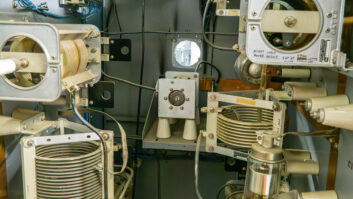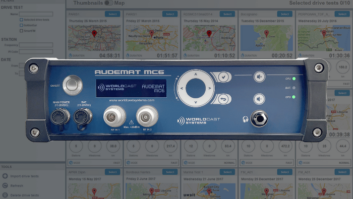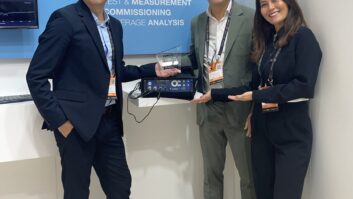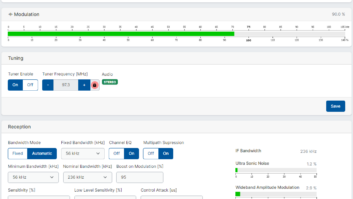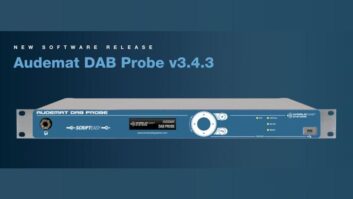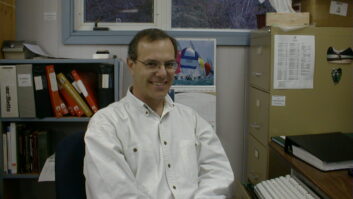
Amill Lone at the MBC Group Facility in Riyadh, Saudi Arabia RIYADH, SAUDI ARABIA — As well as being a major pan-Arab satellite TV broadcaster, the MBC group operates two radio stations, MBC FM, Saudi Arabia’s first commercial radio station, and Panorama FM.
The scale of these stations is massive, with millions of loyal listeners throughout the Gulf region. We broadcast 24 hours a day from studios in Dubai, Riyadh and Jeddah via almost 30 transmission sites across Saudi Arabia, as well as transmission facilities in Iraq, Bahrain and Qatar.
PROPOSALS SATISFIED
The majority of these sites are not manned 24/7 and so, a few years back, we began a project to look into how we could most efficiently and accurately monitor and supervise these remote locations. By “we,” I mean the Technical Operations department that I lead, a group of 45 engineers who look after all the technical aspects of our TV and radio facilities.
We looked at solutions from three leading manufacturers of remote control solutions, and we felt that the Audemat proposal from WorldCast Systems was the one which stood out. It easily met our technical requirements, was available at a highly competitive price and, importantly, offered much better integration with our existing equipment.
An additional factor was the fact that we had worked with several Audemat products, mainly in the area of RDS; we also have WorldCast Systems products from the Ecreso and APT brands within our network, so we felt that this was a partner we could trust.
The proposal we received from WorldCast comprised three separate elements. The first was the hardware itself: in our case the Audemat Control Modular unit, formerly known as the IP2Choice, together with the associated I/O boards and accessories. The system has since been rolled out throughout our 28 Saudi sites, at least 20 of which are unmanned locations. We monitor equipment from five transmitter manufacturers, including Larcan, Rohde and Schwarz and Ecreso, keeping track of major parameters, such as output power, reflected power, VSWR, temperature, voltage, increase/decrease power, switching transmitter, output audio, on-air and standby.
The flexibility of configuration was a key point for us as, with five different transmitter models, we required five connections/configurations. The Audemat Control unit offers a large choice of communication ports so that we can meet the requirements for sites with single or multiple transmitters. It can connect to any external equipment via digital, analog or audio inputs, relays, serial ports or through IP connections such as SNMP. We can then receive information from the remote devices via LAN/WAN, 3G, GSM or PSTN.
The second element of the WorldCast proposal involved customization of the system in terms of what we monitor and how this information is displayed. This is all done using a sophisticated piece of software known as ScriptEasy. In order to help us get up and running as quickly as possible, we provided WorldCast with our main requirements and suggestions and they prepared some views for us in advance. Critically, ScriptEasy enables us to read specific values such as multimeter readings on the various models of transmitter that were not always available to us with the other makes of remote control equipment we had initially considered.
The final part of the proposal covered the installation and training elements. Two of WorldCast’s remote control experts, together with Advanced Semi-Conductor, the system integrator involved, visited our operations center in Riyadh in order to oversee the installation of the Audemat equipment there and in the first five remote sites. This ensured that the rollout went smoothly. During the installation process, the WorldCast staff also provided detailed training to the MBC team that enabled us to complete the installation of the 23 remaining sites. This means that our staff is autonomous should we need to add additional equipment or sensors to any of the sites in the future.
In order to bring the management and monitoring of the full network under centralized control, we invested in Audemat’s Broadcast Manager solution. This is a powerful and comprehensive software application that links all of our remote control units together and enables us to perform continuous monitoring from a single seat using a map-based view with the ability to drill-down into individual sites, units and parameters. It also allows extensive alarm management as the Broadcast Manager centralizes any alarms it receives and ensures that they are dispatched to the relevant personnel in real-time via SMS, email or voice call as appropriate.
Overall, the Audemat Control Modular has provided us with a robust solution that offers excellent performance, making it easy to remotely manage our large networks or sites; it has been working flawlessly since installation in 2010. The fact that it is compatible with all communication protocols means that we have a single solution to help monitor multiple units from different manufacturers across a wide area.
For information, contact Tony Peterle at Audemat/WorldCast Systems in Florida at (305) 249-3110 or visitwww.audemat.com.
